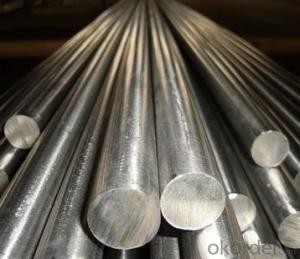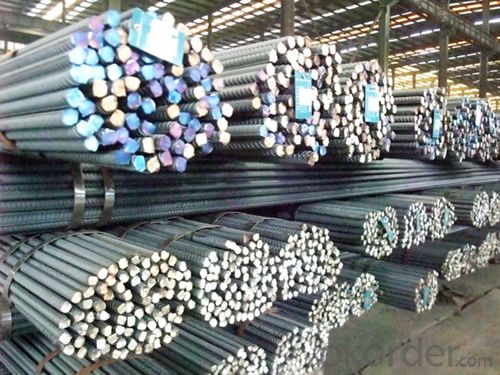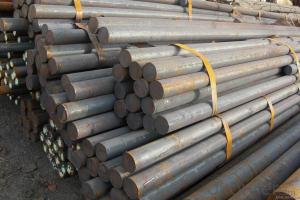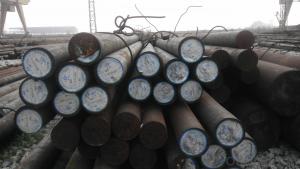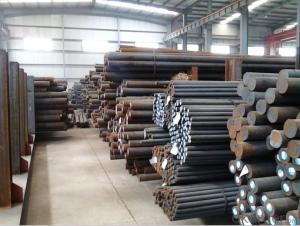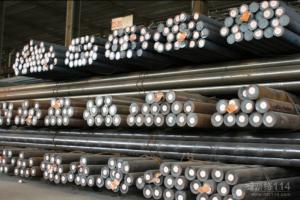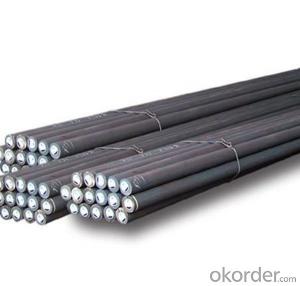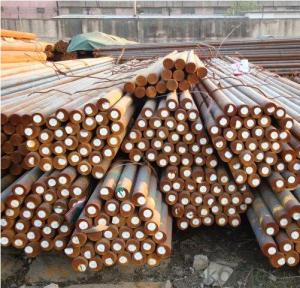Special Steel Alloy Steel Grade AISI H13
- Loading Port:
- China main port
- Payment Terms:
- TT OR LC
- Min Order Qty:
- 30 m.t.
- Supply Capability:
- 10000 m.t./month
OKorder Service Pledge
OKorder Financial Service
You Might Also Like
Specification
Specifications
H13 steel round bars
1.Diameter:10mm~600mm,
2.Delivery Conditon:annealed, black/turned surface
3.Short Delivery Time
Product information
| H13 steel round bars | |||||||
| Chemical Composition(%) | |||||||
| C | Si | Mn | P | S | Cr | Mo | V |
| 0.32-0.45 | 0.80-1.20 | 0.20-0.50 | ≤0.030 | ≤0.030 | 4.75-5.50 | 1.10-1.75 | 0.80-1.20 |
| Specialty | |||||||
| Harden and air cooling steel, 600`C work, high rigidity, high endurance, anti-heating, anti-cracking, electric sediment and middle-melting steel, compact structure, refined in electric cooker, quality of steel is pure, owned good character of equal direction. | |||||||
| Use | |||||||
| 1. Extrusion mold of aluminum and magnesium, die-casting mold, especially adapt to the mold in large and complicated form. | |||||||
| 2. Extrusion mold of copper alloy, die-casting mold | |||||||
| 3. Hot pressing machine mold | |||||||
| Heat Treatment | |||||||
| 1. Quench:1000-1040`C via 600`C and 850`C, preheating oil or wind cooling | |||||||
| 2. Temper temperature and rigidity HBC(reference): | |||||||
| quench hardening 108-300 °c 450-500 °c 550-5700°c | |||||||
| 53-55 51-52 53-54 50-52 | |||||||
| 3. Temper temperature should be higher than working temperature in order to stabilize the working size of mold | |||||||
| 4. Heat up to 650 °c of average temperature in order to eliminate the machined stress, 500 °c air cooling after electric cooker cooling | |||||||
| 5. Tempering, 800-850 °c ,slow cooling after diathermia | |||||||
| Melting Process | |||||||
| 1. EAF: Electric Furnace+LF+VD(Optional) | |||||||
| 2. ESR: Electric Furnace+LF+VD+Eleroslag Remelted(Optional) | |||||||
| UT Class | |||||||
| According to Standard of SEP 1921/84,100% Volume, Level C/c, D/d or E/e | |||||||
| Tolerance on Quantity | |||||||
| +/-10% Per Size | |||||||
Product show
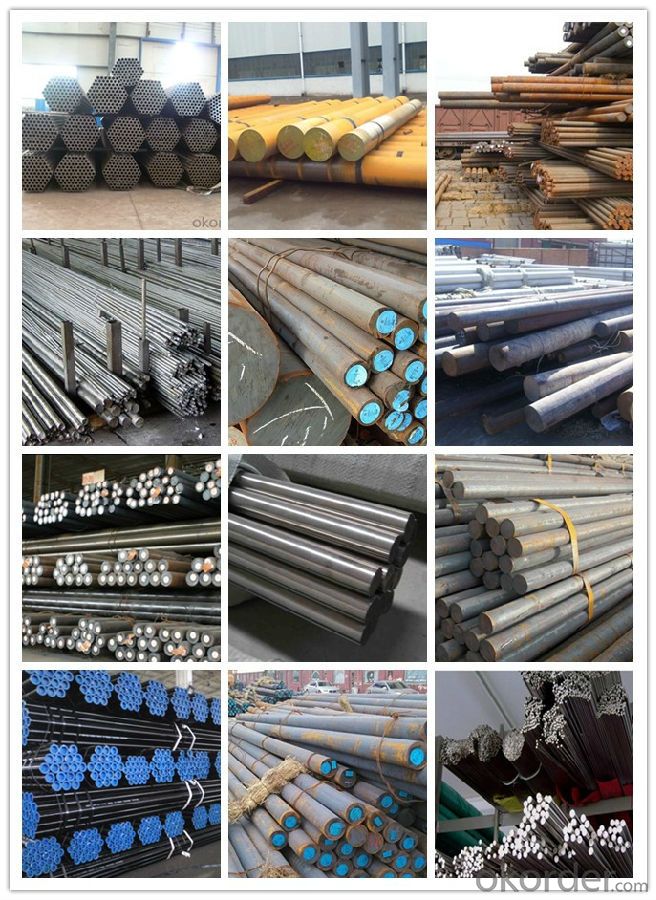
Workshop show
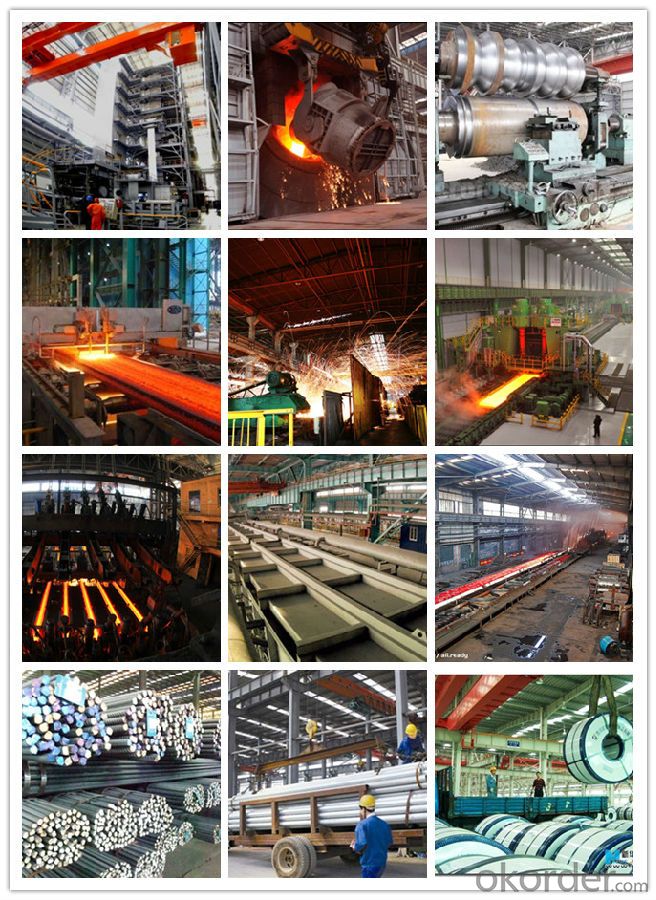
Shipping
1. FedEx/DHL/UPS/TNT for samples, Door-to-Door;
2. By Air or by Sea for batch goods, for FCL; Airport/ Port receiving;
3. Customers specifying freight forwarders or negotiable shipping methods!
Delivery Time: 3-7 days for samples; 5-25 days for batch goods.
Payment Terms
1.Payment: T/T, L/C, Western Union, MoneyGram,PayPal; 30% deposits; 70% balance before delivery.
2.MOQ: 1pcs
3.Warranty : 3 years
4.Package Informations: 1) EXPORT, In 20 feet (GW 25 ton) or 40 feet Container (GW 25 ton)
2)as customer's requirement
Why choose us?
(1) The leading exporter in China special steel industry.
(2) Large stocks for various sizes, fast delivery date.
(3) Good business relationship with China famous factories.
(4) More than 7 years steel exporting experience.
(5) Good after-sales service guarantee.
- Q: What are the different types of corrosion-resistant steel?
- There are several types of corrosion-resistant steel, including stainless steel, weathering steel, and galvanized steel. Stainless steel is the most common type, known for its high resistance to corrosion due to the presence of chromium. Weathering steel forms a protective rust-like layer, providing long-term corrosion resistance. Galvanized steel is coated with a layer of zinc, which acts as a barrier against corrosion.
- Q: What are the properties of magnetic stainless steel?
- Magnetic stainless steel possesses the unique property of being attracted to magnets due to its high iron content. It is also corrosion resistant, making it suitable for various applications in industries such as construction, automotive, and kitchenware. Additionally, it retains its strength and durability even in extreme temperatures, making it a versatile material for different environments.
- Q: What are the different molding grades of special steel?
- Various industries and applications utilize several distinct molding grades of special steel. Some well-known molding grades are: 1. P20: This grade finds wide usage in the production of plastic injection molds, die casting, and extrusion dies. It boasts excellent machinability, high hardness, and good polishability, making it suitable for high-precision molding operations. 2. H13: Primarily used for die casting and forging applications, this grade is a hot work tool steel. It offers high toughness, good heat resistance, and excellent wear resistance, making it suitable for molding processes in high-temperature environments. 3. S7: Commonly employed in molding applications requiring high impact resistance, this grade is a shock-resistant tool steel. It provides good hardness, toughness, and machinability, making it ideal for applications like shear blades and hammer dies. 4. NAK80: Often utilized for high-quality mirror surface molds and precision molding, this grade is a pre-hardened mold steel. It offers high polishability, excellent dimensional stability, and good wear resistance, making it suitable for producing parts with demanding surface finish requirements. 5. 420SS: This grade, a stainless steel, is commonly used in molding applications that require corrosion resistance. It provides good hardness, moderate strength, and excellent corrosion resistance, making it suitable for applications such as medical devices and food processing equipment. These examples represent just a fraction of the available molding grades of special steel on the market. Each grade possesses distinct properties and characteristics that render them suitable for various molding applications. It is crucial to select the appropriate grade based on the specific requirements of the molding process to ensure optimal performance and durability.
- Q: How long does special steel last compared to regular steel?
- Special steel generally lasts longer than regular steel due to its unique composition and properties. Regular steel is made mostly of iron and carbon, whereas special steel is alloyed with other elements such as chromium, nickel, and molybdenum to enhance its strength, hardness, and corrosion resistance. The lifespan of special steel depends on various factors such as the specific type of steel, its usage conditions, and maintenance. However, in general, special steel can have a significantly longer lifespan compared to regular steel. It is more resistant to wear and tear, corrosion, and high temperatures, making it suitable for demanding applications and environments. For instance, in industries such as aerospace, automotive, and construction, special steel is widely used for critical components like engine parts, structural elements, and cutting tools. These components often experience high stress, friction, and exposure to harsh conditions. Special steel's superior properties enable it to withstand these challenges and maintain its performance over a longer period of time. Moreover, special steel is often subjected to rigorous testing and quality control measures during its manufacturing process. This ensures that it meets specific industry standards and can endure extreme conditions without significant degradation. Regular steel, on the other hand, may not possess the same level of durability or longevity. In summary, while the exact lifespan of special steel compared to regular steel can vary depending on various factors, special steel generally lasts longer due to its enhanced properties and resistance to wear, corrosion, and high temperatures.
- Q: Can special steel be used in the production of surgical instruments?
- Yes, special steel can be used in the production of surgical instruments. Special steel, such as stainless steel, is commonly used in the manufacturing of surgical instruments due to its durability, corrosion resistance, and ability to withstand sterilization processes. This type of steel ensures that surgical instruments maintain their integrity and functionality, making them suitable for use in medical procedures.
- Q: How does special steel contribute to the construction industry?
- Special steel contributes to the construction industry in various ways. Firstly, its high strength and durability make it an ideal material for structural components, such as beams and columns, ensuring the integrity and safety of buildings. Secondly, special steel's resistance to corrosion and extreme weather conditions enhances the longevity of structures, reducing maintenance and replacement costs. Additionally, its versatility allows for innovative designs and efficient construction methods, enabling architects and engineers to push the boundaries of construction possibilities. Overall, special steel plays a crucial role in enhancing the quality, performance, and sustainability of construction projects.
- Q: How does special steel perform in renewable energy applications?
- Special steel is a key component in various renewable energy applications and plays a significant role in their performance and durability. The unique properties of special steel, such as its high strength, corrosion resistance, and temperature stability, make it an ideal choice for use in renewable energy technologies. One of the major renewable energy applications where special steel excels is in wind turbines. Wind turbine components, such as the tower, rotor blades, and gearbox, require materials that can withstand harsh environmental conditions and high mechanical loads. Special steel alloys offer excellent strength-to-weight ratios, allowing for lighter and more efficient turbine designs. Additionally, their corrosion resistance properties ensure longevity and reduced maintenance requirements, resulting in increased reliability and overall performance of the wind turbine. In solar power applications, special steel is used in the construction of solar panels and support structures. Solar panels require frames made of durable material to withstand external forces and extreme weather conditions. By utilizing special steel, solar panels can be manufactured to be lightweight, yet strong enough to support the weight of the photovoltaic cells. Furthermore, the corrosion resistance of special steel ensures that the panels remain intact, even in harsh environments. Moreover, special steel is also employed in the production of hydroelectric power. In hydro turbines, the corrosive nature of water and the high pressure and temperature conditions necessitate the use of materials that can withstand such environments. Special steel offers excellent resistance to corrosion, erosion, and cavitation, making it a reliable choice for hydroelectric power generation. Its strength and durability ensure the turbines can operate efficiently and withstand the forces exerted by the flowing water. Overall, special steel performs exceptionally well in renewable energy applications by enhancing the reliability, longevity, and efficiency of various technologies. Its unique properties make it an indispensable material in wind turbines, solar panels, and hydroelectric power generation, contributing to the overall advancement and sustainability of renewable energy systems.
- Q: What are the properties of die steel?
- Die steel is a type of tool steel that possesses a number of important properties. It has excellent wear resistance, high hardness, and good toughness, making it ideal for use in applications that involve cutting, shaping, or forming materials. Die steel also exhibits good heat resistance, enabling it to retain its hardness and strength even at elevated temperatures. Additionally, it has good machinability, enabling it to be easily shaped and formed into various die components. Overall, die steel is known for its durability, strength, and ability to withstand high-stress environments.
- Q: How does special steel contribute to product innovation?
- Special steel contributes to product innovation in several ways. Firstly, its unique properties such as high strength, durability, and resistance to corrosion enable manufacturers to develop new and improved products that can withstand harsh conditions and offer enhanced performance. Secondly, special steel's flexibility and versatility allow for the creation of complex shapes and designs, enabling the development of innovative and aesthetically pleasing products. Additionally, the use of special steel in product manufacturing can lead to advancements in various industries such as automotive, aerospace, and energy, as it allows for the production of lighter, more fuel-efficient, and environmentally friendly products. Overall, special steel provides the foundation for product innovation by enabling the creation of novel, high-quality, and technologically advanced products.
- Q: Can special steel be used in the wastewater treatment industry?
- Yes, special steel can be used in the wastewater treatment industry. Special steel, such as stainless steel or corrosion-resistant alloys, is often utilized in the construction of equipment and infrastructure used in wastewater treatment plants. These materials offer high resistance to corrosion, chemicals, and harsh operating conditions, ensuring durability and longevity in wastewater treatment processes. Additionally, special steel's hygienic properties make it suitable for applications where cleanliness and sterilization are crucial.
Send your message to us
Special Steel Alloy Steel Grade AISI H13
- Loading Port:
- China main port
- Payment Terms:
- TT OR LC
- Min Order Qty:
- 30 m.t.
- Supply Capability:
- 10000 m.t./month
OKorder Service Pledge
OKorder Financial Service
Similar products
Hot products
Hot Searches
Related keywords
